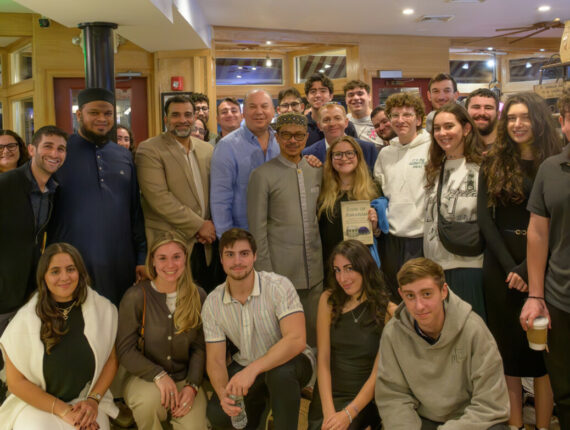
Southampton Press
By Cailin Riley
November 1, 2023

The war in Gaza is unfolding thousands of miles away, but since it began, American Jews have been embroiled in a different kind of war at home.
Antisemitic attacks and threats have risen sharply since Israel began an intense bombing campaign and ground war inside Gaza, in the wake of the deadly Hamas terrorist attacks in Israel on October 7, when more than 1,400 people, including women and children, lost their lives. Since then, more than 8,000 Palestinians have been killed, including more than 3,000 children, against the backdrop of a humanitarian crisis that has been difficult to watch.
The conflict has exposed, and, in many cases, intensified, deep divides and reignited preexisting hatred along religious and ethnic lines; finger-pointing, blame, inflamed rhetoric and misinformation has proliferated online, and, understandably, emotions are raw for many people.
For Jews, and particularly Jewish students on college campuses across America, it has not only been a traumatic moment mentally and emotionally, it has been a genuinely terrifying time. In addition to feeling unsupported or misunderstood by university administrators and other leaders on campus, many also feel unsafe going about their daily lives.
It’s a lot to carry, especially for young people still in the process of learning to make their way in the world as adults.
To meet that moment in a way that could approach healing, provide comfort and foster understanding, Rabbi Marc Schneier of Hampton Synagogue in Westhampton Beach decided to take action.
Schneier and his longtime friend and collaborator Imam Shamsi Ali of the Jamaica Muslim Center in Queens met with 30 Jewish student leaders from colleges in New York City in a special discussion, hosted by the Beach Bakery in Westhampton Beach, titled “New York Campuses Are On Fire — What Should We Do?”
The group of Jewish student leaders was led by Ilya Bratman, the executive director of Hillel at Baruch. The group included Jewish students from Baruch College, City College of New York, Fordham University, the Fashion Institute of Technology, the School of Visual Arts, City University of New York, and others.
Schneier said he was motivated to organize the discussion because he is well qualified to do so, and because he said he could not ignore what has been going on across college campuses.
“I think I’m uniquely positioned in the Jewish world in terms of my platform in the greater global Muslim community,” he said, pointing out that he has well-established ties and relationships with leaders in Arab countries like Qatar and Kazakhstan.
Imam Ali’s presence at the gathering was key, as both he and Rabbi Schneier were determined to present a united front, and be a shining example of how leaders from two different faiths can come together for a greater good.
Ali is recognized as the chief Imam of New York City, as the spiritual leader of a mosque with more than 20,000 congregants. Imam Ali and Rabbi Schneier have been united in the cause of improving Jewish-Muslim relations for more than 20 years, co-authoring the book “Sons of Abraham: A Candid Conversation About the Issues That Divide and Unite Jews and Muslims.”
Schneier is also the president of the Foundation for Ethnic Understanding.
“He and I are on the same page,” Schneier said of Imam Ali. “The message we’re looking to convey is that we cherish our freedoms here in America, to protest and demonstrate, but we cannot cross the line that leads to violence. We can agree to disagree without being disagreeable.”
The venue chosen for Saturday’s gathering was significant. The Beach Bakery, which has long been and remains kosher, is owned by Rashid Sulehri, a Muslim. He maintained the kosher standards when he purchased the business, and also made it halal as well, in accordance with his own faith.
Sitting at tables inside a business owned by someone who saw the value in bringing people of two faiths together, with an audience of two prominent spiritual leaders of those faiths, the students had a lot to say about what they’ve been experiencing lately.
“These students really poured out their hearts to the Imam,” Schneier said. “They shared with him their fear and their anxiety as Jewish students.
“Jewish teens and young men and women in their early 20s attended college to learn about antisemitism, not to experience it,” the Rabbi added.
The students shared those anxieties at the gathering, speaking not only about what they’ve been fearful of in recent weeks, and instances of hatred they’ve experienced lately, but ways they’ve had to change their behavior, and hide or diminish who they are and what they believe in out of fear.
“They voiced their new reality of having to hide their Stars of David or their head coverings,” Rabbi Schneier said. “And how intimidated they feel when they walk by and see signs that say ‘Kill the Jews,’ or ‘Israelis are the Nazis of the 21st century.’ Words can kill.”
Schneier said that, as a Rabbi, his job is to try to help his community transition from “despair to determination,” and he added that the support of someone like Imam Ali is a big part of that effort.
“I’ve often said that a people who fight for their own rights are only as honorable as when they fight for the rights of all people. Many people are pointing fingers at university and college presidents and chancellors, but they can only do so much. This is not going to change until leaders of different faith communities stand up and address these concerns with their own communities.
“The challenge I made to other Muslim leaders is, we need you to protect and defend Jewish students,” Schneier added.
Schneier said he has been committed to speaking out against anti-Muslim rhetoric, which is why he knew he could call on his friend to return the favor.
Imam Ali spoke about why it was important to him to be there and listen to the Jewish students over the weekend.
“We want to define ourselves as two religious communities that have intentions for good,” he said of the shared goal between him and Schneier. “We see that Jews and Muslims are very close in terms of many, many things; traditions, religious teachings. Oftentimes, I’m confused why we have that notion that we don’t like each other.
“The Rabbi doesn’t only talk the talk, but he walks the walk,” the Imam continued. “I’ve been appreciative of him for fighting against Islamophobia, and because of that I fight against antisemitism. Our motto is fighting for each other.”
The Imam spoke more about what being committed to that fight should look like.
“This notion being developed about Jews hating Muslims and vice versa is something we need to minimize, and we have to have a good bridge of understanding,” he said. “There’s a lot of misunderstanding because of the emotions created by war. I and the Rabbi agree that we cannot agree on every single issue, but we have to trust that we have more commonalities than differences.”
The most important commonality, he said, is the visceral understanding of what it feels like to be a constant target of hatred and live under the ever-present threat of violence because of that unjust targeting.
“Islamophobia and antisemitism are equally high, and we want to fight both,” Ali said. “Antisemitism, to me, is just another form of Islamophobia.”
Imam Ali said his goal at the weekend gathering was simple — to listen, and to empathize.
“I wanted to assure them that, as an Imam, I hear them and I’m going to do everything possible to make sure we build better bridges,” he said, adding that both he and Rabbi Schneier were scheduled to meet with a coalition of Muslim university students at Lehman College in the Bronx later this week.
Schneier said that the reactions of the Jewish students made it clear that Ali was accomplishing that goal.
“They were ecstatic that they were able to share these feelings with such a prominent Imam,” he said. “All the different leaders of Hillels on college campuses have been frustrated that they’re not able to have such an open conversation with the Muslim student associations on college campuses. I think they were just elated to have this session and dialogue with Imam Ali. I think it brought them a lot of comfort, consolation and hope.”
Copyright © 2025 Foundation For Ethnic Understanding. All rights reserved. | Privacy Policy